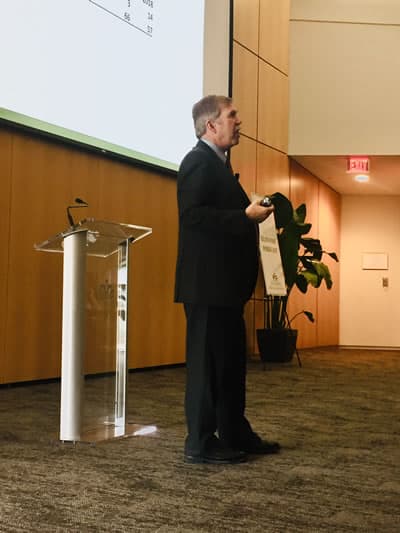Economic growth continues, approaching longest expansion on record

The economy of the United States and North Carolina continues to accelerate and could be headed into the longest economic expansion on record within the next six months, UNC Charlotte professor and economist John Connaughton said.
During the Barings/UNC Charlotte Economic Forecast Wednesday, Dec. 12, Connaughton emphasized the country is in the second-longest economic expansion since 1854. This economic expansion has been underway for 114 months, as of September 2018. The longest economic expansion on record is 120 months, recorded in the 1991 to 2001 expansion.
“With the national unemployment rate consistently below 4 percent, more job openings than job seekers, modest interest rates (in a historical context), and continued consumer optimism, it will take a considerable negative event to slow the economy,” Connaughton said.
Connaughton added not only is the economic growth continuing, but it has also experienced an extra bump.
 “Positive continued economic growth in 2019 would represent the 10th consecutive year of economic growth for the North Carolina economy. While this is an impressive string of growth, the size of that economic growth until recently has been somewhat lacking. During the second and third quarters of 2018, it appears that both the U.S. and North Carolina economies are beginning to feel the impact of the 2018 tax decrease,” he said.
“Positive continued economic growth in 2019 would represent the 10th consecutive year of economic growth for the North Carolina economy. While this is an impressive string of growth, the size of that economic growth until recently has been somewhat lacking. During the second and third quarters of 2018, it appears that both the U.S. and North Carolina economies are beginning to feel the impact of the 2018 tax decrease,” he said.
It remains to be seen if this economic growth from the tax cut can be sustained over the long term, Connaughton said.
“The bump up in the state’s GSP growth experienced during the second through fourth quarters of 2018 is likely temporary and is expected to fall back to a more modest rate of growth by 2019,” stated Connaughton. “The 2018 bump up resulted from the fiscal policy tax rate decreases and an initial response to the rollback of government regulations on business. By 2019, the overriding longer term forces of stagnate labor force growth and modest productivity growth will dictate a slower potential GSP growth rate.”
The economic outlook remains positive. The Consumer Confidence Index remains high, Connaughton said. In November, the index reached 135.7, down slightly from the October index of 137.9.
Unemployment, meanwhile, is at a record low. The United States started 2018 with an unemployment rate of 4.1 percent, which has declined to 3.7 percent by October. North Carolina started the year with a 4.5 percent rate of unemployment, which declined to 3.6 percent by October. By December 2018, the North Carolina unemployment rate is expected to drop to 3.5 percent.
Connaughton shared the early economic outlook for 2019. Gross State Product (GSP) is expected to reach a level of $597,550.2 million in 2019. Real (inflation-adjusted) GSP is expected to increase by 2.9 percent over the 2018 level. Fourteen of the state’s 15 economic sectors are forecast to experience output increases during 2019. The sectors with the strongest expected growth are construction with a projected real increase of 5.7 percent; other services with a projected real increase of 4.9 percent; information with a projected real increase of 4.9 percent; and transportation, warehousing; utilities (TWU) with a projected real increase of 4.9 percent.
Connaughton presented his quarterly forecast to members of the Charlotte business community and the media at a luncheon held at UNC Charlotte Center City. The forecast is sponsored by Barings.
Connaughton’s report is available online.